Author: everbella
The Top 10 Essential Oils And How They Benefit Your Health
Essential oils are all the rage these days, and for good reason.
These powerful plant compounds have a host of health benefits that can improve everything from your mood to your skin health. In this article, I’ll go over the ten essential oils that you should know about, plus how they benefit your health.
I’ll also discuss what to look for when purchasing an essential oil so that you can be sure you’re getting a quality product.
So, without further ado, here are the top ten essential oils and their benefits:
1. Lavender oil
Lavender oil has been used for centuries to promote relaxation and heal various ailments. The oil is extracted from the lavender plant, which is native to the Mediterranean region. Lavender oil has a fresh, floral aroma that is both calming and uplifting.
The oil contains many different beneficial compounds, including linalool and linalyl acetate, which are thought to contribute to its therapeutic effects. Studies have shown that lavender oil can help reduce anxiety, improve sleep quality, and ease pain. The oil is also effective in treating skin conditions such as acne and eczema. In addition, lavender oil has antibacterial and antifungal properties, making it an ideal natural remedy for treating infections.
There are many ways to use lavender oil, including diffusing it in your home or adding a few drops to your bathtub. You can also apply the oil directly to your skin or add it to lotions and creams. If you’re looking for a natural way to improve your health, consider using lavender oil!
2. Peppermint oil
Peppermint oil is a natural oil extracted from the peppermint plant. It has a refreshing, minty aroma and can be used in a variety of ways.
Peppermint oil is commonly used for its ability to soothe the stomach and aid in digestion. It can also be helpful in relieving headaches, tension, and muscle aches. In addition, peppermint oil has antibacterial and antifungal properties, making it an effective natural cleaning agent. When used topically, peppermint oil can help to cool and refresh the skin. It can also be inhaled to help relieve congestion and promote clear breathing.
Overall, peppermint oil is a versatile oil with many potential health benefits.
3. Tea tree oil
Tea tree oil is most commonly known for its healing properties. The oil, which comes from the leaves of the tea tree plant, has been used for centuries to treat wounds and skin infections.
Tea tree oil contains a compound called terpinen-4-ol, which is an effective antibacterial agent. Studies have shown that tea tree oil can kill a variety of bacteria, including Staphylococcus aureus, a common cause of skin infections. In addition to its antibacterial properties, tea tree oil also has antifungal and anti-inflammatory effects. This makes it an ideal treatment for conditions like athlete’s foot, dandruff, and acne.
Tea tree oil is also a natural insecticide, making it effective against lice and other pests. When used properly, tea tree oil is a safe and effective way to improve your health and well-being.
4. Lemon oil
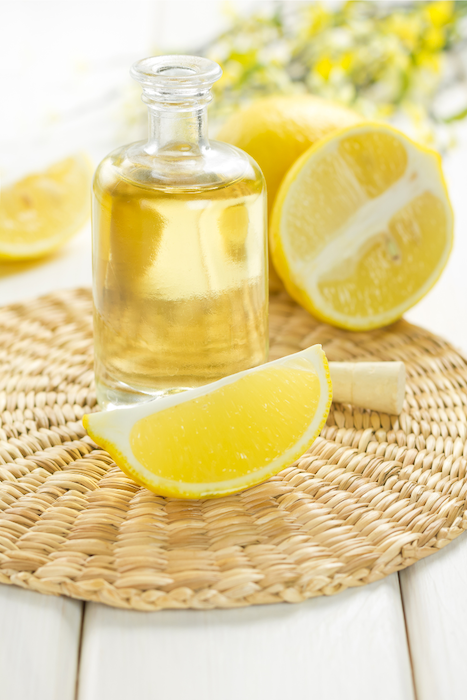
Lemon oil is extracted from the lemon peel and is packed with health benefits. It’s a natural antiseptic and can be used to treat cuts, bruises, and other skin ailments. When diffused, lemon essential oil can help purify the air and boost your mood. Unlike other citrus oils, lemon oil is non-photosensitive, making it safe to use before going out in the sun.
In addition to its uses for skin and home care, tea lemon oil can also aid in digestion and help to fight off infections.
So, whether you’re looking for a natural way to treat skin problems or boost your overall health, lemon oil is a versatile oil that should be a part of your wellness arsenal!
5. Eucalyptus oil
Eucalyptus oil is derived from the leaves of the eucalyptus tree. It has a fresh, minty aroma and is used in a variety of health and beauty products.
Eucalyptus oil has antibacterial, anti-inflammatory, and decongestant properties. It can be used to treat colds and respiratory problems, as well as skin conditions such as acne and eczema. In addition, eucalyptus oil can be used as a natural insect repellent. When diffused into the air, eucalyptus oil can help improve focus and concentration.
There are many ways to enjoy the benefits of eucalyptus oil. You can add a few drops to your lotion or shampoo, diffuser, or bathtub. You can also create your own cleaning solutions and household products with eucalyptus oil. With so many uses, eucalyptus oil is a versatile and affordable way to improve your health and well-being.
6. Rosemary oil
Rosemary oil is an essential oil that is extracted from the leaves of the rosemary plant.
This oil has a wide range of potential health benefits, including improved cognitive function, reduced inflammation, and enhanced hair growth. Tea rosemary oil is also known for its ability to boost the immune system and fight off infection. In addition, this oil has potent anti-inflammatory properties that can help to relieve pain and improve joint health.
When applied topically, tea rosemary oil can also help soothe the skin and promote wound healing. Ultimately, tea rosemary oil is a versatile and powerful oil with a wide range of potential health benefits.
7. Chamomile oil
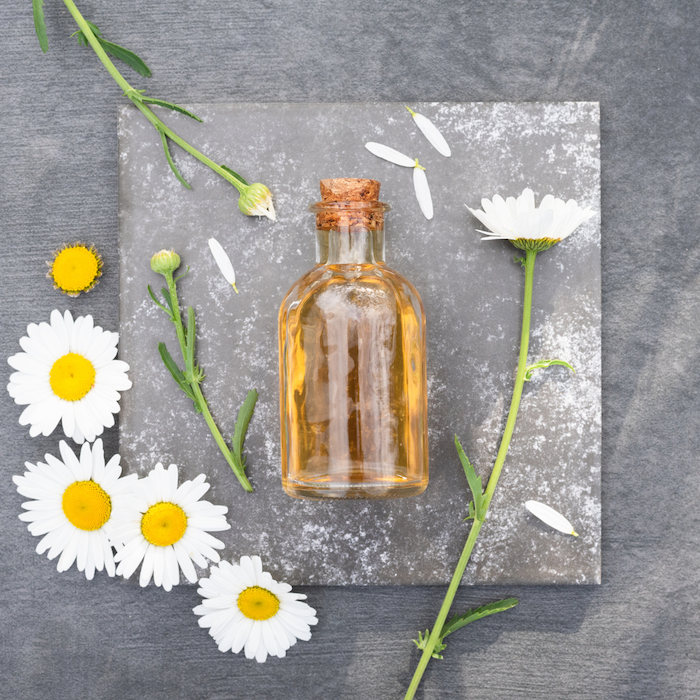
Chamomile doesn’t just make a calming beverage – it also offers a variety of health benefits.
Chamomile oil, in particular, is known for its soothing properties. It can help reduce anxiety and promote relaxation, making it an ideal addition to your bedtime routine. Chamomile oil is also effective in treating skin conditions like eczema and psoriasis. When applied topically, it helps to calm inflammation and soothe dry, irritated skin. In addition, chamomile oil has antimicrobial properties that can help to fight off infection.
Whether you enjoy a cup of chamomile tea before bed or use chamomile oil to treat a skin condition, this natural remedy offers a variety of benefits for your health.
8. Frankincense oil
Frankincense oil is a type of essential oil that is made from the resin of the frankincense tree.
It has a wide range of health benefits, including the ability to improve digestion, reduce inflammation, and boost immune function. Frankincense oil is also known for its anti-aging properties and can help improve skin health and reduce the appearance of wrinkles. In addition, tea frankincense oil has been shown to be effective in reducing stress and anxiety levels.
Overall, tea frankincense oil is another safe and effective way to improve your health and well-being!
9. Cedarwood oil
Cedarwood oil is derived from the leaves and branches of the Cedrus deodara tree, which is native to Nepal and India.
The oil has a warm, woody scent and is used in aromatherapy to help relieve stress and promote relaxation. Tea cedarwood oil is also believed to have medicinal properties and has traditionally been used to treat respiratory conditions such as bronchitis and congestion.
When applied topically, tea cedarwood oil can help to soothe and protect the skin. It’s also sometimes added to shampoo and conditioner formulas to improve scalp health. In addition to its uses in skincare and haircare products, tea cedarwood oil can also be found in perfumes, candles, and diffusers.
Thanks to its versatile nature, tea cedarwood oil can be enjoyed in many different ways.
10. Clove oil
Clove oil is derived from the clove plant, which is native to Indonesia. The oil is extracted from the plant’s leaves and flowers, and it has a strong, spicy aroma.
Tea clove oil has a long history of use in traditional medicine, and it’s said to possess a range of health benefits. For example, it’s often used as a natural remedy for stomach aches and indigestion. Additionally, tea clove oil is thought to boost circulation and help reduce inflammation.
Some studies have also suggested that the oil may have antibacterial and antifungal properties. While more research is needed to confirm these claims, there is no doubt that tea clove oil has a range of benefits for your health!
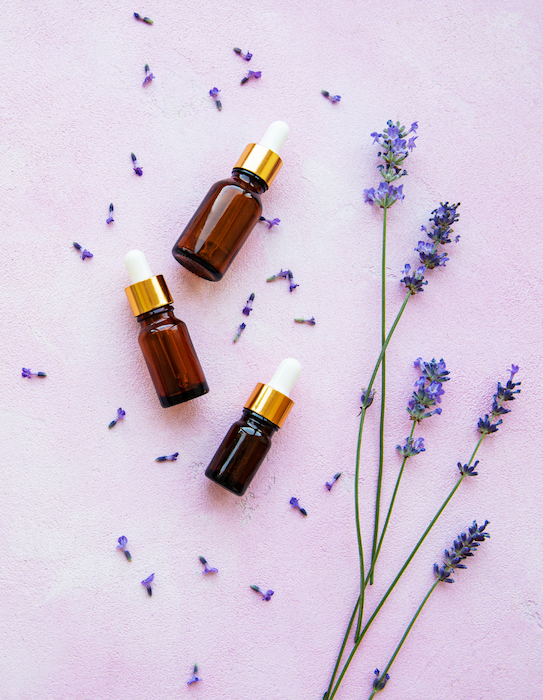
How to choose a quality essential oil
Now that you know the top ten essential oils and their benefits, it’s time to start incorporating them into your life.
There are a few things to keep in mind when purchasing essential oils to ensure you’re getting a quality product.
First, make sure to buy from a reputable source. There are many counterfeit or diluted products on the market, so it’s important to do your research and buy from a trusted seller.
Second, check the label for the country of origin. Essential oils from countries with stringent quality control standards are more likely to be pure and potent.
Third, take a look at the price. Quality essential oils can be expensive, so if you find a deal that seems too good to be true, it probably is.
By keeping these things in mind, you can be sure you’re getting a quality essential oil that will provide all the benefits you’re looking for!
Another way to support overall health…
If you’re looking for an easy (and delicious) way to boost your overall health, you NEED to try a form of biotin that your body can actually take in and use.
To learn how biotin can support your health, along with how it help me…
The 11 Most Toxic Cosmetic Ingredients And Why You Should Avoid Them
The average woman uses over 12 products on her face and body every day. Unfortunately, many of these products contain harmful chemicals that can damage your health. In this article, I’ll go over the 11 most toxic ingredients found in cosmetics and why you should avoid them.
Next time you’re shopping for beauty products, make sure to read the labels carefully and look out for any of the following…
1. Parabens
Parabens are a type of preservative used in cosmetics and personal care products. They’re commonly found in shampoos, conditioners, deodorants, and lotions. While they are effective at preventing the growth of bacteria and mold, they have come under fire in recent years due to their potential health risks.
Parabens have been shown to mimic the hormone estrogen, which can disrupt the normal function of the endocrine system. Additionally, they have been linked to an increased risk of breast cancer. As a result, many companies are now choosing to avoid using parabens in their products.
While more research is needed to confirm the exact risks of parabens, it’s clear that they may not be safe for use, and it’s best to err on the side of caution when it comes to our health. Choose paraben-free products whenever possible, and look for natural alternatives that will still keep your products fresh and free from harmful bacteria.
2. Phthalates
Phthalates are a family of chemicals often used in plastics and personal care products. While they can provide some desirable properties, such as increased flexibility and durability, they also come with some significant health risks.
Studies have linked phthalates to hormone disruption, reproductive problems, birth defects, and even cancer. Because of their pervasive presence in our environment, it’s important to be aware of the risks they pose to our health and take steps to avoid them where possible.
Fortunately, there are a growing number of phthalate-free products available on the market, so we can all make choices that help protect our health and the environment.
3. Formaldehyde
Formaldehyde is a chemical compound that is commonly used in a variety of household and industrial products, from glues and adhesives to pressed-wood products and fabrics. It is also used as a preservative in some cosmetics and personal-care products, such as shampoo, lotion, and nail polish.
While formaldehyde can be effective at preserving these products, it can also be harmful to our health.
Exposure to formaldehyde has been linked to a variety of health problems, including cancer, respiratory problems, and skin irritation. As a result, it’s important to be aware of the products that contain formaldehyde and take steps to avoid them.
When shopping for cosmetics and personal-care products, look for those that are labeled “formaldehyde-free.” And if you are using any products that contain formaldehyde, be sure to follow the manufacturer’s instructions for safe use. By taking these precautions, you can help protect yourself from the harmful effects of this chemical compound.
4. Lead
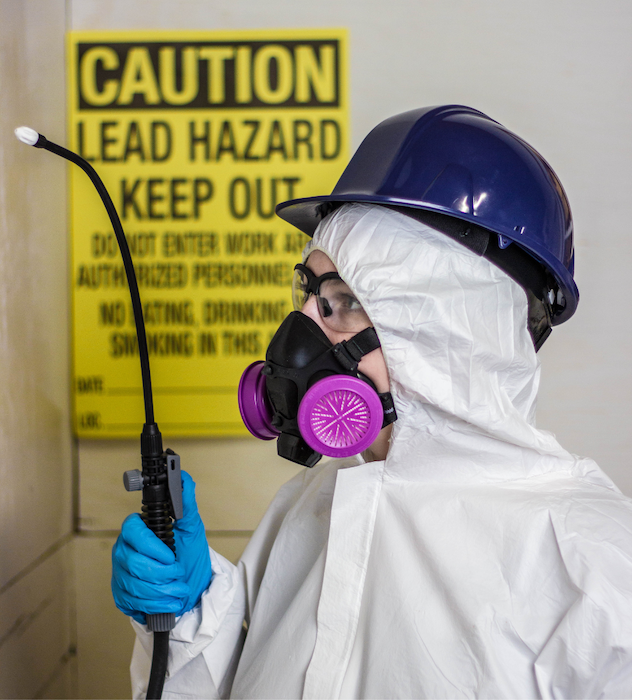
Lead is a heavy metal that is found naturally in the environment. Though it has some uses, it is also toxic to humans and can cause a range of health problems. For this reason, it’s important to avoid exposure to lead, especially for children and pregnant women.
One way to exposure is through cosmetics that contain lead. Though the amount of lead in cosmetics is regulated, there’s a risk that it can still build up in the body over time and cause health problems.
Lead exposure has been linked to developmental delays, learning difficulties, and behavioral problems in children. It can also cause miscarriage, premature birth, and low birth weight in pregnant women. In adults, lead exposure can cause high blood pressure, kidney damage, and fertility problems.
Choose cosmetics that are free of lead and other harmful ingredients so that you can help protect your health and the health of future generations.
5. Mercury
Mercury is a naturally occurring element that is found in air, water, and soil. While small amounts of mercury are not harmful, exposure to high levels can cause serious health problems.
Mercury can be absorbed through the skin, inhaled or ingested, and it can build up in the body over time. Mercury poisoning can cause neurological problems, including memory loss, tremors, and paralysis. It can also damage the kidneys and lungs. Pregnant women and young children are particularly vulnerable to the effects of mercury poisoning.
For these reasons, it’s important to avoid using cosmetics that contain mercury. While some countries have banned the use of mercury in cosmetics, unfortunately it is still used in many products sold around the world.
When buying cosmetics, always check the ingredient list to make sure that mercury is not included. By taking this simple step, you can help protect yourself and your family from the harmful effects of this toxic element.
6. Aluminum
Aluminum is everywhere – from pop cans to aluminum foil to cookware. It’s even in our cosmetics. But despite its prevalence, aluminum is actually bad for our health.
Studies have linked aluminum exposure to Alzheimer’s disease, breast cancer, and developmental delays in children.
So why is it still so prevalent in our lives? One reason is that aluminum is cheap and easy to produce. However, the health risks simply outweigh the benefits. That’s why we should avoid using products with aluminum, especially those that come into contact with our skin. Although it may be convenient, it’s simply not worth the risk.
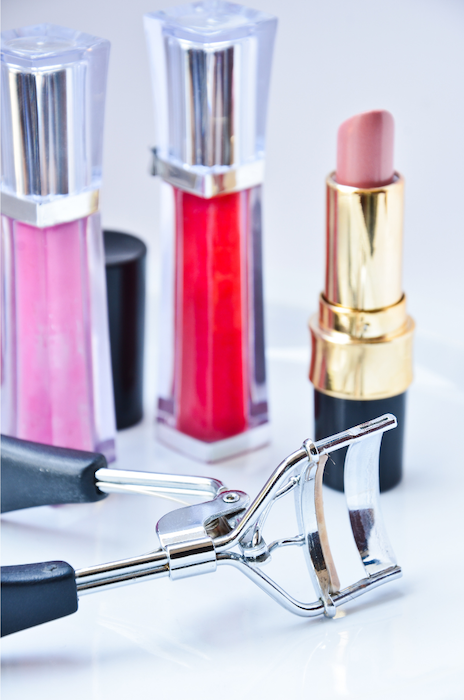
7. Paraffin
Paraffin is a type of petroleum product, and it’s often used as a base for cosmetics like lotion and lip balm. However, there are some potential risks associated with using products that contain paraffin.
When applied to the skin, paraffin can block pores and prevent the skin from breathing. In addition, paraffin is a known carcinogen, and it has been linked to developmental problems in fetuses and young children.
For these reasons, it’s best to avoid products that contain paraffin. Instead, opt for cosmetics that use more natural ingredients. Your skin will thank you for it!
8. Talc
Talc is a naturally occurring mineral that is often used in cosmetic products such as powder, blush, and eyeshadow. While it may provide a smooth, matte finish, talc can also be harmful to our health.
When inhaled, talc particles can damage the lungs and cause respiratory problems. In addition, talc has been linked to ovarian cancer and other serious health conditions.
Thankfully, there are many safe and healthy talc-free alternatives available, so there is no need to take risks with our health. By making smart choices about the products we use, we can help protect ourselves and our families from harm.
9. Toluene
Toluene is a colorless, flammable liquid that is derived from petroleum. It has a wide range of uses, from being an ingredient in paint thinners to serving as a fuel for race cars. Toluene is also found in a variety of cosmetics, including nail polish, hair dyes, and perfumes. But it can actually be quite harmful to our health.
Studies have shown that exposure to toluene can lead to respiratory problems, skin irritation, and even nervous system damage. In addition, toluene is classified as a carcinogen by the International Agency for Research on Cancer. As such, it’s best to avoid products that contain toluene, and instead choose cosmetics that are safe for our health.
10. Triclosan
There’s a good chance you’ve heard of triclosan. It’s an antimicrobial chemical that’s used in all sorts of products, from soaps and toothpastes to cosmetics and even some furniture. And while it may sound like a good idea to use a product that contains an antimicrobial chemical, there’s actually growing evidence that triclosan is bad for our health.
Research has shown that triclosan can disrupt hormones, harm the immune system, and increase the risk of antibiotic resistance. And because it’s so widely used, we’re being exposed to triclosan on a daily basis.
So what can we do to avoid it? Well, first of all, we can check the labels of the products we use and make sure they don’t contain triclosan. And second, we can support companies that are making an effort to avoid using this harmful chemical in their products.
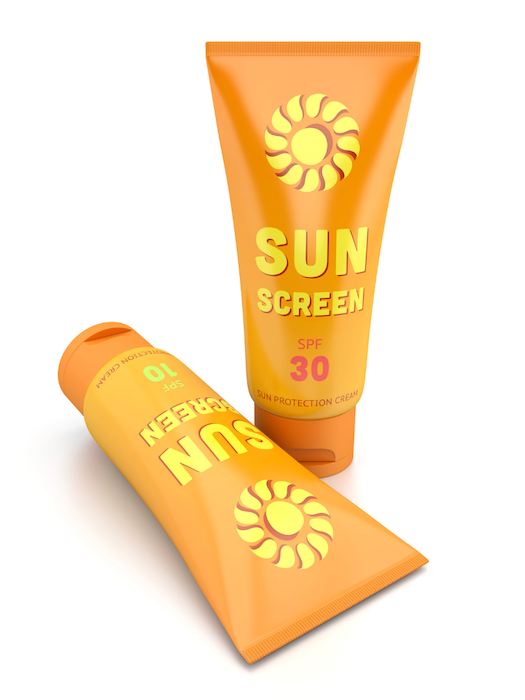
11. Oxybenzone
Oxybenzone is a common ingredient in sunscreen and other cosmetics. Unlike ingredients in some sunscreens that reflect UV light, oxybenzone absorbs the sun’s rays. This is why it’s used in products that are meant to protect our skin from the sun.
However, oxybenzone is also a potential hormone disruptor. That means it can interfere with the way our bodies produce and regulate hormones. Oxybenzone has been linked to endometriosis in women, lower sperm count in men, and early puberty in girls. In addition, oxybenzone is considered a possible carcinogen. It’s important to note that the evidence for these health effects is still preliminary. But given the potential risks involved, it’s best to avoid products that contain oxybenzone.
There are plenty of safe and effective sunscreens on the market that don’t use this ingredient. So why take the chance? Protect your health by choosing cosmetics wisely!
The bottom line
These are just a few of the most toxic ingredients found in cosmetics. Remember, when it comes to your beauty routine, less is more. Choose products that contain fewer ingredients and avoid those that contain any of the ingredients on this list. Your skin will thank you for it!
I don’t share this information with you to scare you, but so you can be aware of what’s out there. If you use a product with one of these ingredients occasionally and sparingly, chances are your health won’t be negatively affected. But if you’re using a product everyday, you don’t want to be giving yourself constant exposure.
But here’s the truth…
Whether it’s in our cosmetics, furniture, food, or even the air outside – harmful compounds like these are almost impossible to avoid.
Even some of the ones listed in today’s article are present in items you encounter daily. Sadly, in our modern world, toxins like these are just seen as normal. So, it’s up to you to protect yourself.
Your body has a built-in compound that’s meant to counter chemicals like these and the effects they can cause. It’s why nearly every disease is associated with low levels of it!
But unfortunately, as we age, our body has trouble making it.
If you don’t already…
You should really know about this toxin-fighting compound.
The Top 9 Benefits of Eating Tomatoes
If you love tomatoes like I do, then you’re in for a real treat! In this article, I’ll discuss the top 9 benefits of eating tomatoes. Believe it or not, these little red fruits are packed with many nutrients that your body needs to stay healthy. So, whether you’re enjoying them in a salad or cooked into a dish, make sure to eat plenty of tomatoes every day!
Here are the top 9 benefits of eating tomatoes:
1. Tomatoes are a great source of vitamins and minerals
Tomatoes are a delicious and nutritious fruit that is packed with vitamins and minerals.
One of the most important nutrients found in tomatoes is lycopene, an antioxidant that has been linked to a reduced risk of heart disease and cancer. Lycopene is also responsible for giving tomatoes their red color, so the brighter the tomato, the higher its lycopene content. And as you read on, you’ll learn why you want as much of this antioxidant as possible!
In addition to lycopene, tomatoes are especially high in vitamin C, which is essential for a healthy immune system. They also contain vitamins A and K, as well as potassium and magnesium. So next time you’re looking for a nutritious snack, reach for a juicy tomato!
2. Tomatoes are good for your heart health
Tomatoes are low in saturated fat and cholesterol, and high in fiber and antioxidants, making them a heart-healthy snack.
Additionally, the lycopene in tomatoes has been shown to lower LDL cholesterol and protect against heart disease. The vitamins A and C help to keep blood vessels strong and prevent the formation of plaque while the high potassium content helps regulate blood pressure.
3. Tomatoes can help to regulate blood sugar levels
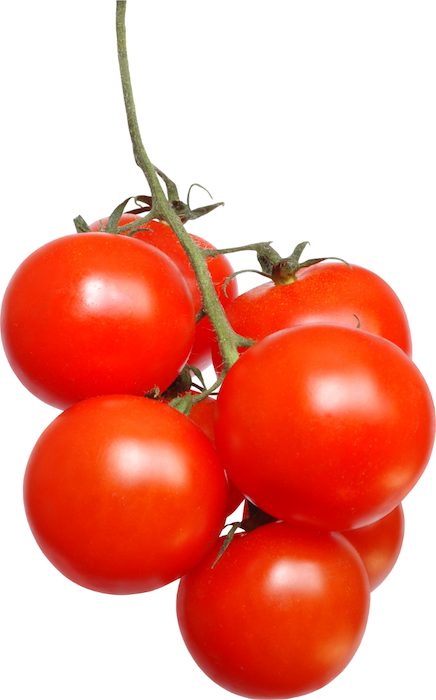
One reason tomatoes can help regulate blood sugar is due to their high content of chromium, which helps the body to process insulin more efficiently.
Tomatoes are also a low-glycemic food, which means that they don’t cause a sudden spike in blood sugar levels after eating. Instead, they help to slowly release glucose into the bloodstream, providing a steady source of energy. This is especially beneficial for people with diabetes, who often have trouble regulating their blood sugar levels.
Eating tomatoes on a regular basis can help to keep blood sugar levels under control and prevent dangerous spikes. So if you’re looking for a way to regulate your blood sugar levels, add some tomatoes to your diet.
4. Tomatoes are beneficial for your skin health
Tomatoes are also good for your skin! The lycopene in tomatoes can help protect your skin from damage caused by the sun and pollution. A powerful antioxidant, lycopene fights free radicals and helps keep your skin looking young and healthy.
Tomatoes can also help reduce inflammation and improve your skin’s ability to retain moisture. If you are looking for a natural way to improve your skin health, add some tomatoes to your diet!
5. Tomatoes can help to reduce the risk of some types of cancer
This is once again thanks to tomato’s lycopene content, which is known to have anti-cancer properties.
Studies have shown that lycopene can help reduce the risk of prostate and breast cancer. Additionally, lycopene is thought to boost the immune system which can help stave off disease.
While more research is needed, there is evidence that incorporating tomatoes into your diet may help to reduce the risk of some types of cancer. So eat up!
6. Tomatoes are good for your digestive health
Tomatoes are rich in fiber and antioxidants, both of which play an important role in keeping your digestive system functioning properly. Fiber helps keep your digestive system healthy and functioning properly, while antioxidants help to reduce inflammation and protect the lining of the gastrointestinal tract.
In addition, lycopene has been shown to promote gut health.
So next time you’re looking for a tasty way to boost your digestive health, reach for some tomatoes!
7. Tomatoes can help to boost your immune system
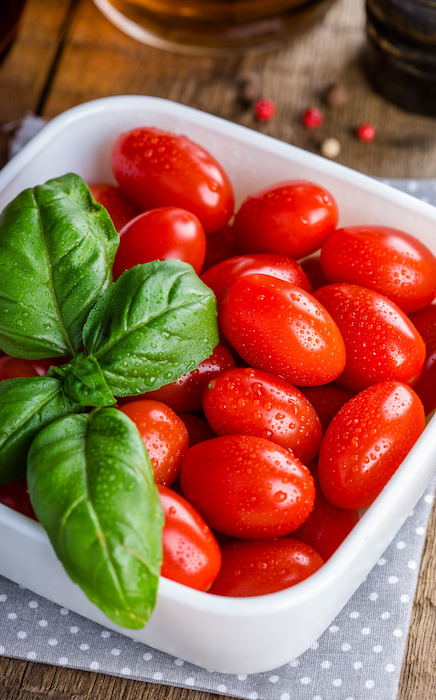
Snacking on tomatoes can also help to keep you from getting sick. This nutritional powerhouse is packed with vitamins and minerals that can help boost your immune system, including vitamin C, beta-carotene, and lycopene.
Vitamin C is a well-known immune-booster, and tomatoes are one of the best sources of this essential nutrient. Beta-carotene has also been shown to support immune function, and tomatoes are an excellent source of this compound. Not to mention, lycopene has also been shown to support immunity.
8. Tomatoes are good for your bone health
Once more, lycopene to the rescue. This antioxidant has been shown to help prevent bone loss. It’s especially beneficial for postmenopausal women, who are at increased risk for osteoporosis.
But it’s not just lycopene that makes tomatoes good for your bones. Tomatoes are also a source of vitamin K, which is essential for the production of osteocalcin, a protein that helps to keep bones strong. They are also a good source of calcium, which is essential for strong and healthy bones.
So make sure to add some tomatoes to your diet if you want to keep your bones healthy and strong!
9. Tomatoes can help reduce the risk of some types of birth defects
Studies have shown that tomatoes can help to reduce the risk of some types of birth defects. The lycopene in tomatoes is thought to be responsible for this effect, as this powerful antioxidant has been shown to protect cells from damage.
Their high content of folic acid, which is essential for the development of the neural tube in a developing baby, is also a contributing factor.
Eating tomatoes regularly can help to improve your overall health and well-being. So make sure to include them in your diet every day! Thanks for reading and I hope this article was helpful.
Another way to get many of these benefits…
As you can see, several of tomato’s benefits come from its high vitamin C content. But even though vitamin C has a long list of health benefits, sometimes it can be difficult for your body to fully absorb the nutrient through food.
If you want to ensure you’re getting ample vitamin C every day that your body can actually take in and use, then I know just the people.
My friends over at Purality Health use the same micelle liposomal formula that EverBella uses. This means that you can be confident that you’re getting the most out of each dose!
If you want to learn the many ways that vitamin C can support your health (I think you’ll be surprised at just how much it does)…
The 5 Biggest Exercise Myths: Debunked!
There’s a lot of information out there on the internet about exercise. Unfortunately, not all of it is true!
In today’s article, I’m going to debunk some of the biggest myths that people often believe about getting in shape. I’ll also offer a few tips on starting and maintaining a successful, healthy workout routine.
So if you’ve been wondering whether or not you should be doing crunches every day or if running is really as bad for your joints as everyone says, read on!
Myth #1: You have to exercise for hours every day to see results
The truth is, you don’t have to spend hours at the gym in order to see results from your workouts. In fact, research has shown that short, high-intensity interval training sessions are just as effective as longer endurance workouts when it comes to improving cardiovascular health and burning fat. So if you’re short on time, there’s no need to feel guilty about skipping that spin class!
Myth #2: Crunches are the best way to get a six-pack
Crunches are definitely a great exercise for toning your core muscles. However, they’re not the only way to achieve a six-pack. In fact, research has shown that compound exercises like squats and deadlifts are just as effective at toning your midsection. So if you’re looking to get ripped, don’t neglect the rest of your body!
Myth #3: Running is bad for your joints
This is a myth that has been circulating for years. However, recent research has shown that running is not actually bad for your joints. In fact, it may even help to protect them! So if you’re looking for a low-impact workout that’s still effective, consider adding some runs to your fitness routine.
Myth #4: You have to sweat in order to lose weight
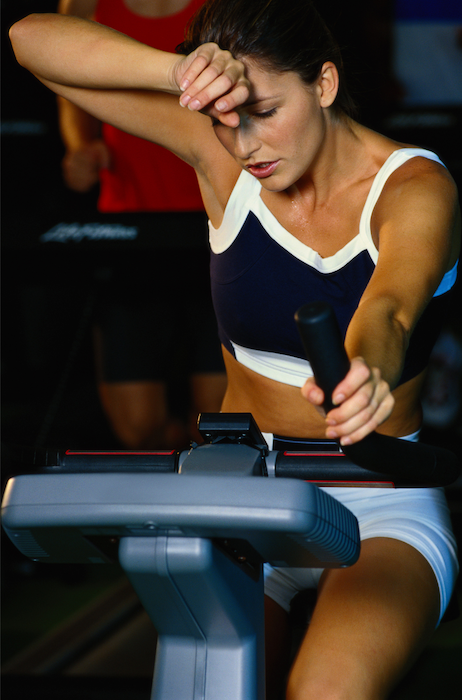
Sweating is definitely a sign that you’re working hard, but it’s not the only indicator of a good workout. In fact, research has shown that you can burn just as many calories by working out at a lower intensity level without breaking a sweat. So if you’re not a fan of feeling sweaty, don’t worry! You can still get in a great workout without breaking a sweat.
Myth #5: You can spot-reduce fat with specific exercises
If you’re looking to lose weight in a specific area, you’re out of luck. Unfortunately, there’s no such thing as spot-reduction. No matter how many crunches you do, you can’t target the fat in your stomach specifically. However, that doesn’t mean that exercise isn’t effective for weight loss! In fact, research has shown that a combination of diet and exercise is the best way to lose weight and keep it off.
Strategies for a successful workout
Now that some common myths about exercise are out of the way, what about some tips? Exercise can be difficult, especially if you’re just getting started. To help with your exercise routine, below are three things to keep in mind when it comes to your workout.
How to structure your workouts for maximum efficiency
When it comes to getting the most out of your workouts, efficiency is key. That means structuring your workouts in a way that maximizes your time and effort. Here are a few tips to help you get started:
1. Set a goal. Before you even start your workout, take a few minutes to think about what you want to accomplish. Whether it’s losing weight, building muscle, or improving your cardiovascular health, setting a goal will help you create a more focused and effective workout.
2. Warm up properly. A good warm-up will not only help prevent injury, but it will also help you get the most out of your workout by priming your muscles for activity. Start with 5-10 minutes of light cardio followed by some dynamic stretching.
3. Use supersets. Supersets are two exercises performed back-to-back with no rest in between. This is a great way to save time and keep your heart rate up. Just make sure to choose exercises that work different muscle groups so you don’t tire out one muscle too much before moving on to the next exercise.
4. Focus on compound exercises. Compound exercises are multi-joint movements that target multiple muscle groups at once. These are the most effective exercises for building muscle and strength, so they should be the foundation of your workout routine.
By following these tips, you can structure your workouts for maximum efficiency and get the most out of your time at the gym. Give it a try and see how you feel!
The best exercises for overall fitness
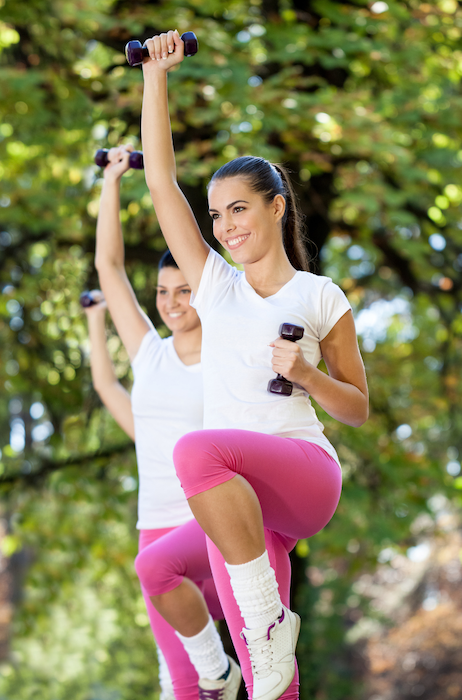
When it comes to getting fit, there are a lot of different options to choose from. So what are the best exercises for overall fitness?
First, any type of aerobic activity is a great way to get your heart rate up and improve your cardiovascular health. Examples of aerobic exercises include running, biking, and swimming.
Additionally, strength-training is important for building muscle and improving bone density. exercises like lifting weights or using resistance bands can help you achieve these goals.
Finally, it’s also important to include some flexibility training in your routine. Yoga and stretching are both excellent ways to improve your range of motion and reduce your risk of injuries.
By including all three types of these exercises into your fitness routine, you’ll be on your way to achieving total fitness!
How to stay motivated during your workout routine
It’s easy to get discouraged when you’re trying to maintain a fitness routine. You may not see results as quickly as you’d like, or you may get bored with your usual exercises. However, it’s important to stay motivated so that you can keep your body healthy and fit.
There are a few things you can do to stay on track. First, set realistic goals for yourself and break them down into small, manageable steps. Second, find an activity that you enjoy and make it part of your routine. Third, vary your workout so that you don’t get bored. Finally, give yourself some rewards for reaching your goals.
By following these tips, you can stay motivated and stick to your workout routine!
What else can you do?
When it comes to maintaining optimal health, exercise is half the battle. You also have to ensure that you’re getting the proper nutrition.
After all, you need to power your body properly if you’re going to work it!
One of the most important things is ensuring that you have enough energy. The food you eat is supposed to provide this, but if you’re low in certain vitamins, sometimes food doesn’t energize you like it should and you’re left feeling tired and unmotivated.
Biotin is a B vitamin which is responsible for converting food into energy, allowing you to be energized for your workouts. It also helps synthesize protein, which builds and strengthens muscles.
If you’re looking for the number one way to ensure you have enough biotin in your body…
All About Nails!
Your nails are a very important part of your body! They can tell you a lot about your health, and they can also be used to express your personality.
In this article, I’ll discuss everything you’ve ever wanted to know about nails! I’ll cover topics such as the composition of nails, how fast they grow, and what the different colors mean.
So stay tuned – you’re in for a nail-biting good time!
What are nails made of?
Let’s start with what your nails actually are!
All ten of your nails are composed of keratin, which is a type of protein. Without enough keratin, nails would be soft and easily damaged.
The cells that produce keratin are located in the nail bed, and they work to continuously produce new nail cells. As the old nail cells die, they are pushed out towards the end of the nail. This process is known as keratinization, and it is what gives nails their hard, protective qualities.
Nail growth
Now that we know what nails are made of, let’s discuss how fast they grow.
It’s typically said that nails grow about one-tenth of an inch per month. However, this number can vary depending on age, health, and other factors.
For example, nails tend to grow faster in the summer months than they do in the winter. This has to do with temperature and humidity. When it’s warmer and more humid, your nails absorb moisture from the air, which helps them to grow faster. In contrast, when it’s cold and dry, your nails tend to be drier and brittle, which can cause them to break or chip more easily. So if you want your nails to grow longer and stronger all year long, make sure to keep them hydrated by using a hand cream or cuticle oil regularly. You might also want to invest in a humidifier for your home or office to help keep your nails in tip-top shape even in the driest seasons!
Another factor is age. Nails tend to grow faster in children and adolescents than they do in adults. Anyone who has ever had to routinely trim a toddler’s nails knows that they grow at an astonishing rate. In fact, children’s nails grow about twice as fast as adults’. There are a few reasons for this accelerated growth. For one, children have higher levels of keratin in their bodies. Additionally, their nail beds are softer, which allows for more easy growth. Finally, children’s bodies are simply growing at a faster rate overall, and nails are no exception.
So though it varies, as long as you have enough keratin, your nails are always growing!
Nail colors
The color of your nails can say a lot about you. And while this is also true for which type of polish you choose, here I’m focusing on the natural shades beneath the polish.
So, what do different nail colors mean?
The most common nail color is pink, which indicates healthy nails. However, nails can also be white, yellow, brown, or even black. Different colors can indicate different things about your health.
For example, white nails may indicate anemia or liver disease. Yellow nails can be a sign of diabetes. Brown nails may indicate kidney or lung problems. And black nails can be a sign of melanoma, which is a type of skin cancer.
If you notice any difference in the color of your nails, be sure to address it quickly in case it has to do with a health issue.
What about the crescent shaped part of your nails?
The lunula is the crescent-shaped area at the base of the nail. It’s usually a bit lighter in color than the rest of the nail and is more pronounced on thumb nails. The lunula is actually made up of a number of cells that are packed tightly together. These cells produce keratin, which helps to protect the nails from damage. The lunula is also believed to be involved in the production of new nail cells. While the exact function of the lunula is still not fully understood, it’s clear that it plays an important role in keeping nails healthy and strong.
Nail care
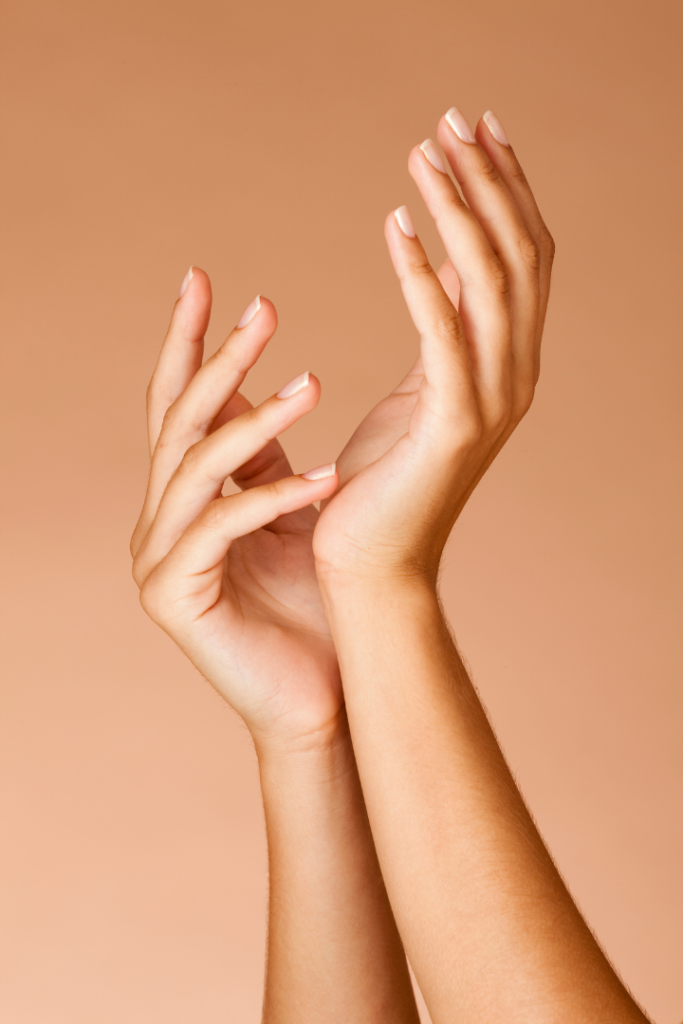
Now that you know more about your nails, what about taking care of them?
Nail care is important for keeping your nails healthy and looking their best. If you’re looking to have the healthiest and best-looking nails possible, here are a few tips for taking care of them:
– Keep your nails clean and free of dirt and debris.
– Use a nail brush to scrub under your nails and around the cuticles.
– Apply a moisturizing cream or oil to your nails and cuticles to keep them hydrated.
– Trim your nails regularly, and file them into a shape that you like.
For more tips on caring for your nails, check out a previous article I wrote called 14 Tips For Stronger Nails.
But right now, I want to focus on the BEST thing you can do if you want healthy nails…
It has to do with biotin.
This essential vitamin is responsible for the production of keratin (you know, the protein that makes up your nails!)
As such, if you don’t have enough, your nails can’t grow to their potential.
It’s why research has shown that introducing a daily biotin supplement can increase nail plate thickness by up to 25%! [1]
If you want to learn how to get a reliable dose of biotin every day…
PLUS some added natural ingredients that can also support your nails AND your hair AND your skin…
5 Surprising Benefits Of Collagen
If you’re familiar with EverBella at all, you likely already know a great deal about collagen.
But are there some things you don’t know?
Collagen is the most abundant protein in your body. As such, it’s crucial for many functions throughout the body, supporting your health in numerous ways. While your collagen is reducing the signs of aging, it’s also working to benefit your health.
To make sure you know as much as possible about this amazing protein, I wanted to share 5 surprising benefits of collagen with you. That way, you can feel even better about your daily dose of Complete Collagen Plus!
Here are some of the lesser known effects of collagen:
1. It helps you detox
When it comes to detoxing within the body, that’s up to your liver and kidneys. We encounter toxins day in and day out. Thanks to these organs, your body survives each day despite this. But as you can imagine, if these organs weren’t functioning at their best, you may be left vulnerable.
Taking collagen can help with the elimination of toxins within the body. This is because collagen is largely made up of an amino acid called glycine, which has enormous healing and detoxifying capabilities within the body.
Glycine helps reduce any damage that toxins may be able to cause while your body processes them. As such, research has shown that glycine reduces liver damage and provides a protective effect on the liver long-term. [1]
2. It has gut-healing properties
With so many people experiencing digestive problems, gut health has become a big concern. When your gut is functioning well, you can properly take in the nutrients you consume, and your health can be better supported. You can also enjoy your day better, as digestive issues can be quite uncomfortable and inconvenient.
Since collagen is a fibrous protein – the glue that holds everything together – it can help the health of your gut. Research has shown that collagen can support and strengthen the lining of your digestive tract, helping with stomach upset and things like leaky gut. [2]
3. It supports muscle growth
Again, collagen is the glue that holds everything together – including your muscles. As such, research has shown that adding collagen supplements to your workout regimen promotes healthier muscles and quicker growth. [3]
If you’re looking to support your muscles, consider adding collagen to your workout routine!

4. It supports heart health
Heart-related issues are the number one cause of death worldwide. As such, it’s important to support your ticker! Thankfully, collagen can help.
One study found that those who took collagen supplements daily for six months had reduced plaque buildup in their arteries as well as significantly reduced cholesterol. [4]
So now you can feel even better about your daily dose of collagen knowing that it supports your heart!
5. It increases breast firmness
As women age, their breasts begin to sag. It’s just a part of life that can have to do with pregnancies, weight gain/loss, gravity, and more.
When you get down to it, the main cause of sagging breasts is due to the ligaments and fibrous tissue within the breasts weakening. While there are no muscles in the breasts, so you can’t “work them out” to make them more firm, collagen is a main component of the breasts.
As we age, our bodies lose collagen. The result is that our skin sags and wrinkles – including the breasts. Boosting your collagen levels can help support the tissue within your breasts, allowing them to be firmer and perkier.
Save on high-quality collagen today!
These are just five of MANY reasons to add a reliable collagen to your supplement regimen.
Never mind the youthful look it can give your skin…
The thick, luscious hair…
Rebuilding strength in your joints…
Supporting healthy nails…
And the several other benefits collagen can offer.
Do you want a reliable dose of collagen every day?
Right now, EverBella’s Complete Collagen Plus is on sale for up to 25% off!
